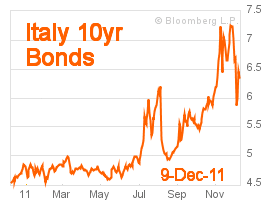This morning’s key headlines from GenerationalDynamics.com.
* Euro Zone leaders reach an agreement to save the euro
* Hopes for ECB intervention are dashed once again
* Bond yields for Italy’s debt fall slightly
* Britain opts out of the eurozone deal
* Britain’s ‘veto’ may represent historic turning point for EU
* Turkey’s exports reach a historic new record
Euro Zone leaders reach an agreement to save the euro
|
|
 |
|
|
Emerging at 5 am on Friday morning from an all-night meeting, eurozone leaders announced a plan to restructure the eurozone. There will be a brand new treaty among the 17 euro zone nations, and all remaining EU nations, except Britain, will join in the new treaty as well. It will take months before the details of the agreement are ironed out, and it will take years to implement, but officials hope that merely stating it will restore confidence to the markets and convince investors that it’s safe to buy toxic bonds from Italy and Spain. Some terms of the agreement are: National budgets would have to be approved by Brussels; debt limits would be imposed on every nation; and sanctions would automatically be imposed on any country that exceeded the debt limits. “What we have achieved tonight is a tremendous step towards a stable Europe,” German Chancellor Angela Merkel told journalists in Brussels on Friday. “This summit will go down in history,” French President Nicolas Sarkozy said. CS Monitor
Hopes for ECB intervention are dashed once again
The “summit that will go down in history” may do that, but what it won’t do is solve any of Europe’s problems. It doesn’t promote economic growth in any way; it doesn’t resolve the banking crisis going on in Greece, Italy, and Spain; it doesn’t resolve the growing panic in European bonds, it doesn’t resolve the problems raised by S&P when it warned of a possible downgrade of all EU debt. Furthermore, even if the agreement meant something, it would still have to be approved by 26 nations, and there would certainly be delays in store. Some parliaments may reject the agreement, and some (e.g., Ireland) may have to have a referendum that may reject it. So no one really believes that Friday’s agreement is going to make any difference to the markets. In fact, it could be said that Friday’s agreement had an audience of just one person: Mario Draghi. If Merkel and Sarkozy can convince Draghi that they mean business, then he’ll arrange for the ECB to “print” unlimited amounts of money and use it to purchase toxic Italian and Spanish bonds. But on Friday, Draghi once again threw cold water on the idea that any such bond purchases are coming. Bloomberg
Bond yields for Italy’s debt fall slightly
|
|
 |
|
|
European officials declared victory on Friday because toxic bond yields (interest rates) fell slightly, but the situation with Italy’s 10-year bonds shows what really happened. As the graph shows, bond yields were on their way back up but took only a teeny-tiny drop on Friday to 6.36% — still an unsustainable level. It promises to be a tense weekend as officials wait to see how markets react on Monday morning to the new eurozone deal. CNN Money
Britain opts out of the eurozone deal
Of the 27 countries in the European Union countries, 26 of them joined the 17 eurozone countries in Friday’s deal, except one: Britain. According to Prime Minister David Cameron:
I said before I came to Brussels that if I couldn’t get adequate safeguards for Britain in a new European treaty, then I wouldn’t agree to it. What is on offer isn’t in Britain’s interests, so I didn’t agree to it. We’re not in the euro and I’m glad we’re not in the euro.
The main point of difference was that euro officials wanted to impose a financial transactions tax on all countries, but it would fall 80% on London, thus providing a back door way for Britain to contribute to eurozone bailouts, even though Britain is not in the eurozone. Britain’s pullout reflects a recurring hostility between France and Britain over EU fiscal matters. This led to a shouting match in 2005 over agricultural subsidies for France, and it’s now peaking again over the financial crisis. Recently, Sarkozy expressed fury that Cameron was meddling in eurozone affairs, even though Britain is not a euro nation, and on Friday morning they exchanged angry words. Analysts say that even though Britain has opted out of the current deal, Brussels may be able to impose a financial transactions tax on London through other means, through trade policy between the eurozone and Britain. Telegraph and Financial Times (Access)
Britain’s ‘veto’ may represent historic turning point for EU
It’s an irony of history that the Maastricht Treaty that formally launched the European project was signed by 12 leaders of the European community exactly 20 years ago, on December 9-10, 1991. European politicians are harshly criticizing David Cameron for not signing on to Friday’s deal, saying that Britain is now completely isolated from the other EU countries. Few doubt that Cameron’s decision represents a historic split in the European Union. Spiegel
Turkey’s exports reach a historic new record
While many countries are in trouble with exports, Turkey is an exception. Turkey’s exports have reached $133.97 billion in the past 12 months, indicating that the country has now broken a new record with the highest level of exports in the history of the republic. Zaman (Istanbul)
COMMENTS
Please let us know if you're having issues with commenting.